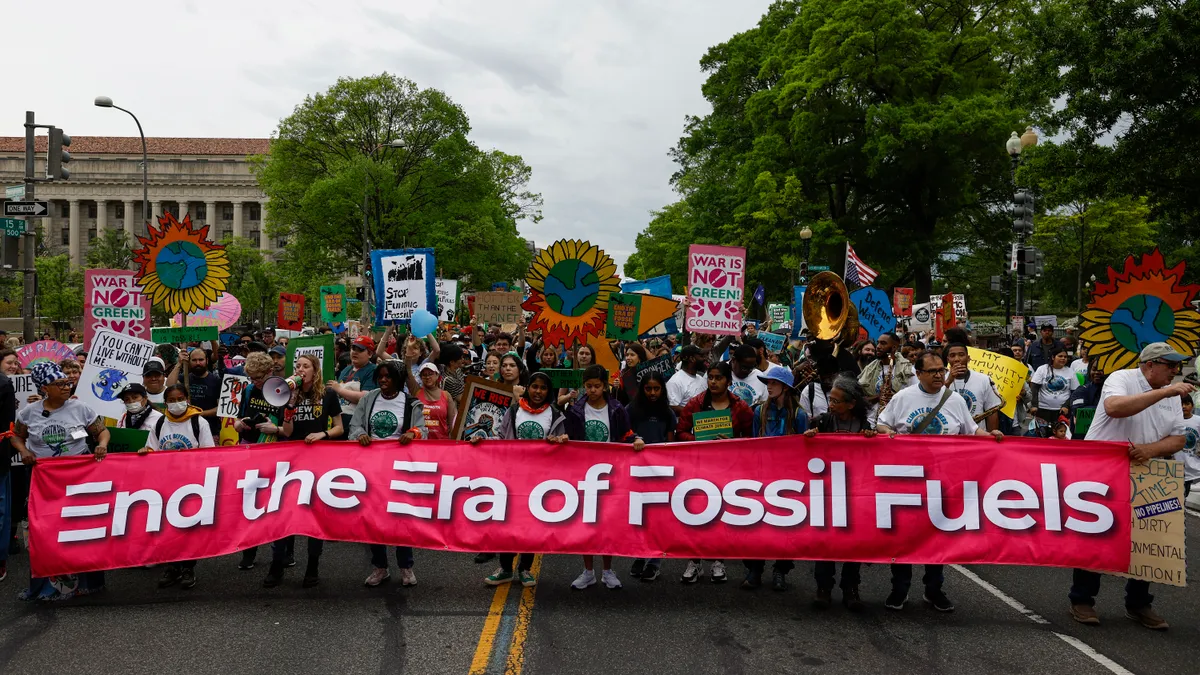A new year is upon us, setting the stage for a fresh outlook on all things dominating the ESG landscape. While not too much has changed since ESG Dive’s first assessment of trends influencing corporate conversations and decisions, a couple new themes have emerged.
All eyes were on the Securities and Exchange Commission for the last quarter of the year as companies waited for its final climate disclosure rule to drop. Though initially slated for an October 2023 release, the agency announced it would finalize the long expected rule in April 2024. However, a climate disclosure rule isn’t the only piece of ESG regulation on the SEC’s schedule for this year.
Beyond sustainability initiatives, a rising tide of backlash has not been enough to stem the diversity, equity and inclusion programs’ growing influence in company strategies. There’s also a fight taking place between companies, shareholder advocacy groups and state and federal legislators over what exactly shareholders should be able to ask of a company.
The year capped with a landmark agreement from global governments at COP28 in the United Arab Emirates, calling for a “transition” away from fossil fuels. With a public squabble with petrostates over the text language now behind, the climate finance market is keeping an eye on those agreements and looking to put its wallet behind that transition.
While all our prior observations still apply, here are the biggest emerging trends impacting how companies approach ESG in 2024
Climate disclosure rule not the only ESG regulation on SEC’s docket
As companies all over the U.S. prepare for the SEC's long-awaited climate disclosure rule that aims to hold them accountable for their sustainability practices, they must also take stock of other upcoming ESG-related bills from the agency.
The agency’s regulatory agenda for 2024 also unveiled other rules that would impact how corporations disclose certain information regarding their social and sustainability practices.
First among these is an update to the Human Capital Management Disclosure rule, which would require companies to disclose temporary and contract workers, employee turnover data, employee compensation and benefits information, workforce health and safety information, and demographics data. The rule, also slated for an April release, additionally proposes incorporating a concrete definition of the term “human capital” so companies can follow a uniform criterion when disclosing data on their respective human capital.
The update was unanimously approved by the SEC’s Investor Advisory Committee last fall and has been lauded by Democratic lawmakers as “vital to help investors understand how companies treat their most critical asset — the workers.” Some senators even called on the SEC to expedite its release last month.
The agency’s 2024 agenda also revealed that the proposed Enhanced Disclosures by Certain Investment Advisers and Investment Companies about Environmental, Social, and Governance Investment Practices rule is in its final stage, and also expected in April, making it a big month for ESG observers. Originally published to the Federal Register in June 2022, the rule will require investment companies and investment advisers that promote ESG funds to specify how ESG factors actually impact and steer the investment strategies of these funds.
Other notable mentions expected later in October this year include a proposal to increase disclosures on the diversity of corporate board members and nominees.
These bills and proposals indicate that while all eyes may be on the agency’s climate disclosure rule, environmental legislation isn’t the SEC’s only priority when it comes to ESG reporting.
And while companies and asset managers are now aware of the climate disclosure rule’s release date, they also have an enhanced vested interest. SEC Chair Gary Gensler said in December that without his agency’s climate disclosure rule, the European Union’s more stringent climate disclosure regulations would take precedence.
DEI debate increases foothold in companies’ ESG reporting strategy
Diversity, equity and inclusion initiatives have recently become the focal point of companies’ social strategy, situated against a backdrop of the U.S. Supreme Court striking down affirmative action in college admissions in 2023 and overturning Roe v. Wade in 2022.
Such developments have prompted corporations across the country to disclose their own policies surrounding healthcare and diversity, not only to be more transparent with their employees but also to address rising concerns from investors. The construct of corporate ESG reporting — which has historically leaned more on sustainability measures and performance — has evolved over time to include policies and goals companies have adopted to better address the “S” component of the acronym.
Cincinnati, Ohio-based supermarket chain Kroger, for example, initially categorized the social or “people pillar” part of its ESG policy under topics such as food access, health and safety, and an “inclusive economy,” but didn’t outrightly mention reproductive healthcare and abortion access initiatives for employees in its latest ESG report. However, after the Supreme Court eliminated the constitutional right to an abortion, the grocer said in a June 2022 statement it would cover some of the costs of an employee’s out-of-state travel related to an abortion procedure as part of the company’s healthcare and benefits coverage.
“Corporations can no longer avoid politics … and just hide in the shadow of the wings,” Yinka Faleti, former Missouri Secretary of State candidate and venture capitalist, told ESG Dive. “They will have to state their position.”
Faleti said that though the natural proclivity of most companies has been to remain apolitical in the past, the “twin tidal waves of the George Floyd movement and the pandemic have changed the landscape entirely.” This shift, according to him, has led to companies being called on to disclose their stance on LGBTQ issues, DEI and even abortion.
Further, Faleti said this demand for more transparency regarding businesses’ position on social and welfare issues is also driven, in part, by a new wave of employees. He said millennials, Gen Z, and the generations behind them want to know the values of the corporations they work or intend to work for, and determine whether those values are aligned with their own “on most things.”
Separate from the social policies being put in place by companies, DEI initiatives have also grown in prominence on a state-wide level, with left-leaning states like California introducing legislation that pushes for more DEI disclosures. Last year, Gov. Gavin Newsom signed Senate Bill 54, requiring venture capital firms headquartered or operating significantly in the Golden State to annually report the number of diverse company founders they invest in and disclose data about their race, sexual orientation, gender identity, disability and veteran status.
SB 54 followed the passage of SB 1162, a pay transparency law aimed at advancing gender equity and protecting women rights that passed in 2022. Both California bills advocate for more social data disclosures, which experts say are paramount when discoursing a corporation’s compliance toward its DEI policies and goals.
While DEI has increased in corporate prominence, it has not come without pushback in the wake of the Supreme Court’s decision on affirmative action.
Shortly after the court’s decision, Republican attorneys general from 13 states issued a letter to the CEOs of all Fortune 100 companies — which include Microsoft, Walmart, PepsiCo and others — last July, warning them against hiring, promotions and contracting “under the label of ‘diversity, equity, and inclusion.’”
The letter looked to signal to corporate C-suites and boardrooms that DEI programs were in the crosshairs and said such practices “engage in racial discrimination” and could face serious legal consequences. Experts have expressed concerns on what the Supreme Court’s decision means for DEI in a corporate setting, with some predicting it could even halt diversity-focused efforts in certain companies in the long term.
Investors and legislators are fighting over shareholder rights
Last year’s events catapulted the ESG fight to the proxy floor, as shareholders saw diminishing returns in a year that included a record number of ESG-related shareholder proposals and subsequent proxy votes. While an influx of poorly-received anti-ESG shareholder proposals — which are counted as ESG-related proposals — helped drive approval numbers down, investigations by the House Judiciary Committee majority and Republican AGs across the country have also tamped down enthusiasm for ESG.
The Judiciary Committee subpoenaed financial services groups aligned with the United Nations, shareholder advocacy groups and the nation’s largest asset managers in 2023 as part of a more than yearlong investigation. Committee Chair Jim Jordan, an Ohio Republican, said the committee is investigating whether climate coalitions and shareholder advocacy groups run afoul of antitrust laws.
As Jordan and the committee’s majority see it, such industry climate groups represent such a significant portion of a sector’s market cap that the group can use its influence to pressure companies to do things it otherwise would not.
“Corporations are collectively adopting and imposing left-wing environmental, social, and governance (ESG)-related goals, and [net-zero aligned industry groups] appear to facilitate collusion that may violate U.S. antitrust law,” Jordan wrote in a November subpoena to the Glasgow Financial Alliance for Net Zero.
Similar subpoenas have gone out from coalitions of Republican attorneys general across the country, also alleging that companies incorporating ESG and climate coalitions are violating antitrust laws.
Josh Zinner, CEO of the Interfaith Center on Corporate Responsibility, told ESG Dive there was no “valid legal basis” to support the allegations that collaborative investor actions violate antitrust laws.
“[The allegations are] being used as a cudgel by political opponents in Congress and red state attorneys general alike to intimidate those that are pressing for positive progress on climate and other ESG issues,” Zinner said.
An underreported part of proxy season regards the amount of interaction between investors and companies about proposals that never reach a vote, according to Heidi Welsh, executive director of the Sustainable Investments Institute. Welsh said often in this dialogue companies either come to an agreement before a proposal is submitted for a vote or agreed upon and retracted before a vote takes place.
Andrew Behar, CEO of shareholder advocacy group and subpoena recipient As You Sow, previously told ESG Dive the House Judiciary and attorneys general who have issued similar subpoenas appear to not believe shareholders should have the right to push companies on material risk.
While Zinner doesn’t believe the subpoenas hold legal weight — and ICCR has not received a Judiciary subpoena — he expressed concern that the investigations are making shareholder work on holding companies accountable for their ESG practices more difficult.
Climate financing focused on physical assets, developing markets
The year concluded with the landmark COP28 agreement calling on global governments to begin “transitioning away” from fossil fuels, but the United Nations’ climate body noted it would take time for the true policy implication of the agreement to emerge, including potential accountability measures.
For now, the climate financing market will look to support that transition by putting its money behind assessing and adapting physical assets vulnerable to climate change and the net zero transition and helping developing economies prepare for the shift.
McKinsey & Company estimated last year that $275 trillion — a little over $10 trillion annually — in physical asset investments are needed by 2050 to keep the global temperature rise below 1.5 degrees Celsius. Thomas Kuh, head of ESG strategy for Morningstar’s indexes, told ESG Dive current funding levels are not on trajectory to hit this target.
“The amount of resources that are being mobilized at this point aren't at the level necessary to get there,” Kuh said. “At the same time, I think it's fair to say that we're at that early, early, early stage in the process, and so it's hard to appreciate the extent to which actions taken today are going to sort of get us where we need to go going forward.”
Globally, investors are increasingly looking at physical and transition risks and want to know how their portfolios align with net-zero goals, Anya Solovieva, director of global commercial strategy and climate solutions for Morningstar Sustainalytics said in an interview with ESG Dive.
She added, however, that investors have come to terms with the fact that companies are going to incur some physical risks to climate change, and asset managers are also starting to look beyond traditional physical climate risk assessments.
“As we have seen the manifestations of physical climate change continue to increase in frequency and severity — and also seeing outcomes of global commitments — I think investors are now essentially coming to terms with the fact that we are locking in a certain amount of physical climate change,” Solovieva said.
While traditional risk assessments have focused on real assets like real estate and infrastructure, Solovieva said companies need to start to better understand what sort of exposure is on their corporate bond books, as far as equity. She said that will require seeing what parts of their portfolio have above-average exposure to acute physical hazards like extreme heat, forest fires and flooding.
Sandra Vrejan, a Morgan Lewis partner on its climate finance team, said coming out of COP28, and its Finance Day in particular, she was excited to see global governments make pledges to help emerging and developing economies prepare for the transition and reach net zero.
“I think that there will be a continued focus on those types of transactions, but I think everyone's also interested to monitor how there might be other uses of the capital markets, perhaps through direct investment in climate conservation efforts,” Vrejan said.




















